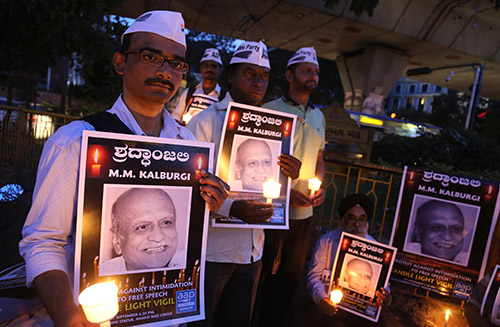“These people will kill you,” Nikhil Wagle, a prominent journalist in India, told me as we discussed reports of him being named as a target by a member of a hard-line Hindu group who is being questioned by police over the murder of a writer.
The Mumbai-based journalist is no stranger to death threats and attacks, as CPJ has previously noted. In 2004, followers of the right-wing Shiv Sena party beat Wagle and blackened his face with engine oil for his critical reporting. In 2009, Shiv Sena claimed responsibility for an attack in which Wagle and other staff at a news station were assaulted, and windows and furniture were smashed. But Wagle, who is editor-in-chief of Marathi-language news channel Maharashtra One, said there is a critical difference between those threats and the more recent ones. “Until now it was common to see mob attacks by political parties like the Shiv Sena. But the groups we are talking about now are militant groups,” Wagle told me.
In the threat he learned about this week, Wagle was allegedly named as the next target by a member of Sanatan Sanstha, a hard-line Hindu group. The group has been accused by authorities of carrying out numerous violent attacks, according to news reports. Police said Wagle’s name was mentioned in intercepted phone calls made by a Sanstha member who they arrested earlier this month in connection with the murder of author and left-wing politician Govind Pansare.
Authorities offered Wagle protection, which the journalist said he initially turned down. “I’ve experienced police protection before. It’s a farce, a formality,” he said to me. “What can a single constable do for me? The government just wants to show it is taking action; it’s not really interested in protecting.”
If police really want to protect citizens they should act against elements threatening rationalists. No need of personal protection..
— nikhil wagle (@waglenikhil) September 23, 2015
The threat against the journalist, who is a proponent of rationalism–the belief in reason over religion—comes amid a series of threats from far-right Hindu groups in India against followers of the same school of thought. This month, several rationalist writers in the southern state of Karnataka allegedly received threats from members of the Sri Rama Sene, a far-right Hindu group, according to reports.
These threats are not be taken lightly. Rationalist scholar M.M. Kalburgi was shot dead at his home last month, and in February, Pansare, who also identified himself as a rationalist, was shot on his morning walk and later died of his injuries, according to reports. In 2013, Narendra Dabholkar, editor of Marathi-language magazine Sadhana, which promotes scientific thought and covers caste, politics, and religion, was shot dead in direct relation to his work, according to CPJ research. Dabholkar, a prominent campaigner against religious superstition, had frequently written critically about religious extremism and had received threats in the days leading up to his murder, his son told reporters at the time.
Wagle said he believes this latest round of threats is related to a fiery news program he anchored on the Marathi-language channel IBN Lokmat in 2011. During one episode, an impassioned Wagle accused one of the guests–a Sanstha member–of spreading propaganda, prompting the guest to walk off the show.
Wagle told The Times of India that following the program, the Sanstha’s mouthpiece, Sanatan Prabhat, published his phone number and photographs of him that had a cross over the images. Wagle said he then began receiving threatening and vitriolic phone calls.
And Wagle is not alone. Shyamsundar Sonnar, a journalist working for Marathi-language newspaper Prahaar, has also allegedly been threatened by the Sanstha, according to a statement released this week by the Mumbai Press Club. Sonnar filed a police complaint, claiming that the group labeled him “anti-Hindu” in an article published this month in its mouthpiece publication, news accounts said.
The Sanstha denies any involvement in the threats or in Pansare’s murder, according to reports.
An entrenched culture of impunity in journalist murders in India offers little confidence to those under threat. India ranked 13th on CPJ’s latest Impunity Index, which spotlights countries where journalists are murdered and their killers go free. At least 24 journalists have been murdered since 1992 in direct relation to their work, nearly all with complete impunity, CPJ research shows.
“Since Modi has come to power the atmosphere is more poisonous,” Wagle told me. “Over the past 15 months under the BJP government, these [far-right Hindu] groups enjoy increased confidence.”
But Indian journalist Smruti Koppikar may have put it best in independent news website Scroll, where she asked: “Has the fiercely argumentative India turned into the intolerant India?”
